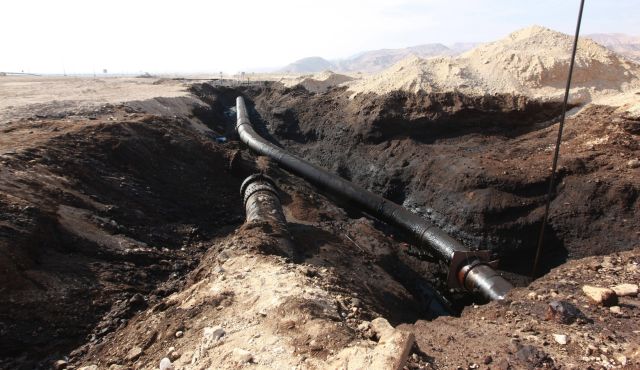[caption id="attachment_135900" align="alignright" width="161"] Oil spill at Evrona Nature Reserve[/caption]
Oil spill at Evrona Nature Reserve[/caption]
Israel may have to pay Iran as much as $100 million after a Swiss arbitration panel ruled that the Islamic Republic deserved to be compensated for the loss of its stake in a joint pipeline after its 1979 revolution, The Marker has learned.
The preliminary ruling, which comes after two decades of arbitration, would pay the value of a 50% stake in the Iran Eilat Ashkelon Pipeline Company, which has more recently been in the news for a huge oil leak in Israelís southern Arava region.
But the ruling, which could grant Iran between $50 million and $100 million, is still far from being final. It is the first of several rulings required in a complicated arbitration case between countries, during which the two sides will be able to file claims and counterclaims before the panel determines the final amount owed, if any.
The preliminary decision was made about a year ago but has never been published. Israel opposes the entire process on legal grounds, but was compelled to take part.
EAPC was formed in 1968 when the two countries were friends as a joint-venture company that would bring Iranian oil from the Gulf to Israelís Red Sea port of Eilat and ship it to terminals in Ashkelon ó avoiding the Suez Canal. From there the oil would be sold and shipped to Europe.
On the eve of the revolution that toppled the Shah and brought Ayatollah Khomeini to power, EAPCís 242-kilometer pipeline contained about 800,000 tons of unrefined Iranian petroleum. That was worth $120 million at the time and about $400 million according to current prices.
Iran should have received half the proceeds from the sale of the oil, but because the new Islamic regime cut diplomatic ties, Israel never transferred the money. Only in the mid-1980s did Tehran act to recover the money and begin international arbitration proceedings in Geneva and Paris. In 2004 it sued Israel for $800 million, an amount it said was equal to all the assets in the joint venture.
The joint-venture agreement states that in the event of a dispute, the arbitration would be conducted in Tehran by a two-person panel consisting of an Iranian High Court judge and an Israeli counterpart. If the two failed to reach a decision, the International Chamber of Commerce would pick a third arbitrator to settle the matter.
Israelís energy minister at the time the Iranians sought compensation, Moshe Shahal, proposed that Israel stick to the terms of the agreement and send an Israeli judge to Tehran Ė something the Iranian regime, now committed to a strongly anti-Israel policy, would never agree to.
In a history of the dispute that followed, published a year ago by attorney Yoav Harris of the Tel Aviv firm Doron, Tikotzky, Cederboum, Iran named its arbitrator in 1994 and asked Israel to name its representative. Israel refused on the grounds that the agreement did not sufficiently spell out the terms for arbitration but required the two sides to try to resolve any disagreements in negotiations Ė something that never happened.
A year later, the Islamic Republic asked a Paris court to order Israel to appoint an arbitrator. Harris contended that the court had no standing in the case, but in 2001 it issued a deadline for Israel to name an arbitrator. Israelís appeal was turned down on the grounds that it refused to recognize the authority of the ICC in the matter.
As a result, the two sides agreed on Geneva as the site for arbitration. Israel again sought to stop the process in a Swiss court, but its petition was again turned down in 2012. Last year an appeal to the Swiss Federal Court also was rejected, so it was forced to pay 1 million shekels ($250,000) in court costs.
By Haaretz
The Iran Project is not responsible for the content of quoted articles.

 QR code
QR code